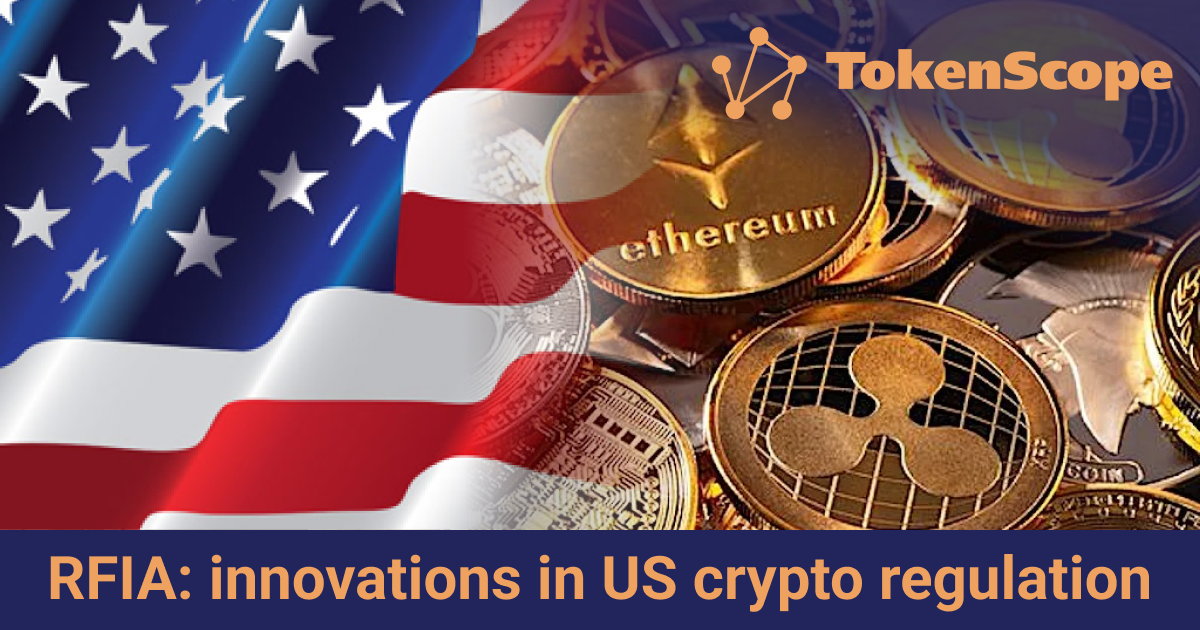RFIA: innovations in US crypto regulation

The TokenScope Team monitors the world most important legislative initiatives in cryptocurrency regulation. In early June, following the announcement that the European Parliament is close to adopt an unified act on EU’s crypto-assets regulation, it was reported that US Senators Cynthia Lummis and Kirsten Gallibrand presented the Responsible Financial Innovation Act (RFIA), which also proposes a comprehensive regulatory framework for regulating digital financial assets in the United States.
Nowadays US is the world leader in the number of FinTech and cryptocurrency startups. Blockchain and Bitcoin were invented in the United States and the first transaction to purchase a real product for this virtual currency was carried out here as well. Despite the fact that a cryptocurrency in the country actually gained recognition in 2014, when the US Internal Revenue Service issued a Notice 2014-21 ) where the rules for taxation of operations with cryptocurrencies were first fixed, at the federal level there is still no unified approach to the regulation of cryptocurrencies and crypto-assets.
Thus, the US Securities and Exchange Commission perceives cryptocurrencies as assets, which refers them more to shares and other stock market instruments than to currencies. The Commodity Futures Trading Commission defines virtual currencies as commodities. The Financial Crime Enforcement Agency (FinCEN), which is responsible for combating on money laundering and terrorism financing, declared in 2013 that virtual currencies are the same as traditional currencies and that money service businesses who deal with them should be defined as money transmitters, and must, therefore, comply with AML/CFT regulations. In this accordance, all virtual assets service providers (VASP) are required to register as financial service providers and comply with anti-money laundering and counter-terrorism financing requirements, such as KYC and the FATF Travel rule.
The authors of the Bill recognize that the lack of clear definitions in the field of regulation of digital assets is one of the pressing issues and give a legal definition to such well-known entities as virtual currency, stablecoins, smart contracts, etc.
In addition, senators introduce such a term as "Ancillary asset which is understood as an intangible, fungible asset that is sold in connection with the purchase and sale of a security through a scheme that constitutes an investment contract and that does not provide rights in a business entity similar to debt or equity issued by that entity. Such assets include tokens of popular blockchain projects such as Solana, as well as most cryptocurrencies. This definition is included to clearly distinguish between digital assets and securities and to provide regulators and consumers with an understanding of which asset is subject to requirements.
The Proposal grants the Commodity Futures Trading Commission the exclusive right to regulate the circulation of digital assets that are not securities, including ancillary assets. The CFTC is also allowed to charge a certain fee from users who exchange digital assets to cover the costs of the Commission in fulfilling the duties of a regulator.
The bill contains extensive requirements for virtual asset service providers. Thus, it is determined that some decentralized autonomous organizations (DAO) must be subject to tax legislation, and therefore, they can be considered as commercial organizations and must be established in accordance with the laws of the United States or foreign jurisdiction.
The requirements for the presence of a “White Paper” of a crypto project also have been established . Virtual asset providers must clearly disclose information related to the proposed product, including how digital assets are handled in bankruptcy, their risks, existing fees, etc.
Special attention is paid to stablecoins issuers. It is determined that all issuers of payment stablecoins must maintain high-quality liquid assets valued at 100% of the face value of all outstanding payment stablecoins; provide public disclosures on the assets backing the stablecoin and their value; and have the ability to redeem all outstanding payment stablecoin at par in legal tender. Establishes a detailed, optional process for depository institutions (banks/credit unions) to issue a payment stablecoin.
The bill proposes to further develop guidance for financial institutions on the issuance of payment stablecoins and further define the obligations of stablecoin issuers to comply with anti-money laundering legislation, as well as provide guidance on sanctions compliance.
The Proposal also addresses to various aspects of the circulation of digital assets, including technical ones, containing the need to develop special measures in the field of information security, separately highlighting the risks of using the digital Yuan. The bill contains sections relating to consumer protection and the impact of mining on the environment.
Thus, the Federal Energy Regulatory Commission, together with the CFTC and the SEC, are invited to to study the problem of electricity consumption in the digital asset industry, including a potential impact of mining on the climate. The question is relevant, as The New York state Assembly had already passed the bill, which would bar new mining operations powered by carbon-based energy sources for two years.
Also, in order to use virtual currency for payment for goods and services the Proposal provides a de minimis exclusion of up to $200 per transaction from a taxpayer’s gross income.
Although this bill is unlikely to become a law before the congressional session adjourns in January 2023, it represents an important step in the development of cryptocurrency regulation and will serve as a guide for future legislation not only in the United States, but also in other countries.




